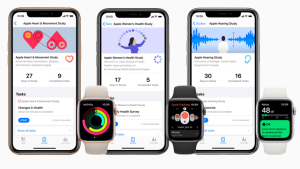A project with the code name "Seabreeze" could end up helping consumers mentally experience the associated cooling, calming sensation. Apple has partnered with biotechnology company Biogen and UCLA for respective cognitive decline and mental health studies meant to assess a smartphone's capacity for user mental health evaluations. While the UCLA effort that will move to main phase this year is indeed known as Seabreeze in the industry, the forthcoming findings from Apple's simply-titled project with Biogen, "Pi," are just as crucial to mental health measurement research.
The Seabreeze research team is combing through data from iPhone video cameras, audio sensors, and keyboards. With the Apple Watch, vital sign, sleep, and movement indicators are being evaluated. Information collected from these devices such as participants' speaking patterns, walking styles, facial expressions, and sleeping patterns can contribute to a fully-realized mental health portrait of the user. If a large enough data pattern presents itself, Apple could translate this diagnostic capability into a feature that warns users of at-risk mental behavior and suggests treatment.
For the Biogen "Pi" research designation, a two-year study of 2,000 participants will be conducted; half of those evaluated are to be at high risk of cognitive impairment. Like Seabreeze, researchers will look at device data, but in this case cognitive impairment is what's being tracked. The discovered data will be set side by side with standard brain health tests, and encouraging results will most likely see Apple institute a cognitive impairment feature for its devices.























